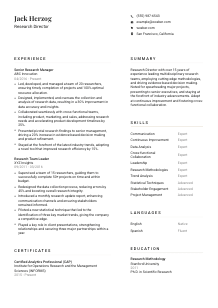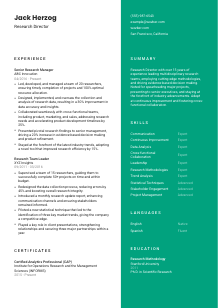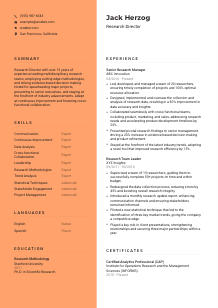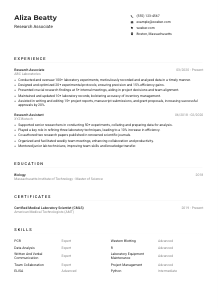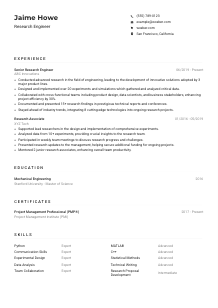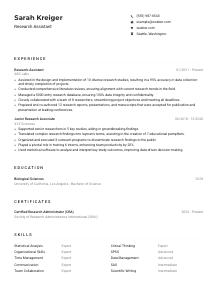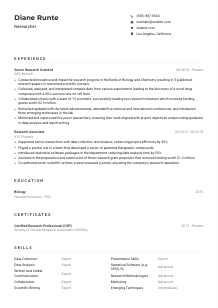Research Director Resume Example
Leading groundbreaking investigations, but your resume seems to be in the shadows? Shedding light, delve into this Research Director resume example, formulated with Wozber free resume builder. Illuminate how you can strategically highlight your scientific sagacity to align with top-tier positions, placing your career at the forefront of innovation.
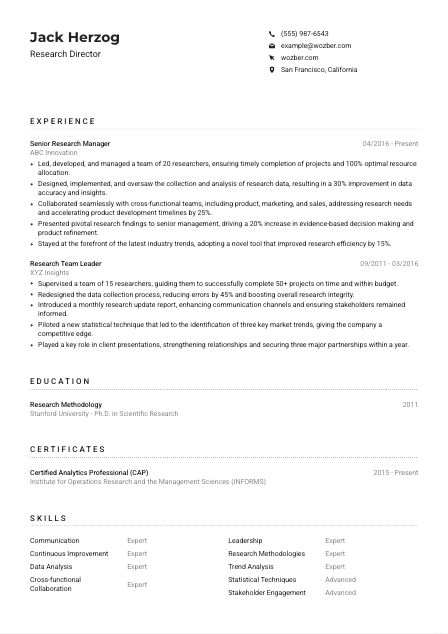
How to write a Research Director Resume?
Embark on a journey to elevate your career to new heights as a Research Director. In the realm of scientific exploration and leadership, your resume isn't just a document; it's a reflection of your contributions, experiences, and the unique path you've carved in the research world. Let Wozber guide you with its free resume builder, ensuring your resume not only meets the criteria for your dream role but stands out in a competitive field, optimized for ATS compliance. Let's shape your professional narrative into an asset that opens doors to exciting opportunities.
Personal Details
The introduction to your professional saga begins with personal details. This section, simple at first glance, requires thoughtful consideration to set the stage right. Let's dive into how to fine-tune your personal information for the Research Director role, ensuring accuracy and alignment with job aspirations.
1. Emphasize Your Name and Title
Your name is your personal brand's headline, and under it, the role you're aspiring for, "Research Director," should be prominently displayed. This not only positions you confidently in the eyes of the hiring manager but aligns your application immediately with the job at hand.
2. Make Contact Information Pristine
Incorporate your most reliable contact number and a professional email address, following the format firstname.lastname@email.com. Double-check for typos to ensure you're accessible for that much-anticipated interview call.
3. Spotlight Your Location
Since the role necessitates being in San Francisco, California, make this detail clear. This addresses one of the job's specific requirements straight away, demonstrating your eligibility and readiness for the position.
4. Include a Link to Your Professional Profile
A LinkedIn profile or a personal website showcasing your professional journey can be invaluable. Ensure it's updated and reflective of your resume. This digital footprint gives depth to your application and a platform for further exploration of your achievements.
5. Eliminate personal Details Unrelated to the Job
Keep details such as your age, gender, or marital status off your resume to maintain a focus on what truly matters: your accomplishments and fit for the Research Director role.
Takeaway
First impressions count, and in the case of your resume, it starts with how you present your personal details. Ensure this section is polished, professional, and perfectly aligned with the position you're pursuing. It's the handshake before the conversation, setting a professional tone for the narrative ahead.





Experience
The meat of your resume lies in your experience section. Here's where you get to showcase how each step of your professional journey has prepared you for the pinnacle role of a Research Director. Let's capture the essence of your professional experiences, tailoring them to resonate with your target role.
- Led, developed, and managed a team of 20 researchers, ensuring timely completion of projects and 100% optimal resource allocation.
- Designed, implemented, and oversaw the collection and analysis of research data, resulting in a 30% improvement in data accuracy and insights.
- Collaborated seamlessly with cross‑functional teams, including product, marketing, and sales, addressing research needs and accelerating product development timelines by 25%.
- Presented pivotal research findings to senior management, driving a 20% increase in evidence‑based decision making and product refinement.
- Stayed at the forefront of the latest industry trends, adopting a novel tool that improved research efficiency by 15%.
- Supervised a team of 15 researchers, guiding them to successfully complete 50+ projects on time and within budget.
- Redesigned the data collection process, reducing errors by 45% and boosting overall research integrity.
- Introduced a monthly research update report, enhancing communication channels and ensuring stakeholders remained informed.
- Piloted a new statistical technique that led to the identification of three key market trends, giving the company a competitive edge.
- Played a key role in client presentations, strengthening relationships and securing three major partnerships within a year.
1. Decode the Role
Begin by dissecting the job description, extracting pertinent details. For instance, leading multidisciplinary teams and proficiency in research methodologies are critical. Identify these elements in your own career and prepare to highlight them.
2. Highlight Relevant Positions
Structure your experience in reverse chronological order, spotlighting roles that align closely with the Research Director position. Whether it was a team you led or a project that you steered, make these the focal points of your section.
3. Craft Impactful Accomplishments
Detail your contributions and outcomes, such as "Designed, implemented, and oversaw the collection and analysis of research data, resulting in a 30% improvement in data accuracy." Use action verbs and quantify achievements to convey the magnitude of your impact.
4. Quantify Where You Can
Numbers speak volumes. They provide a tangible measure of your contributions and successes. Whenever possible, augment your accomplishments with data, be it the size of the teams you've led or the efficiency improvements you've realized.
5. Focus on Relevance
Tailor your experience to mirror the job requirements directly. Extraneous details can dilute the potency of your application. Ensure every point underlines your capability and readiness for the Research Director role.
Takeaway
The Experience section is your opportunity to demonstrate that you're not just a viable candidate but the ideal fit for the Research Director role. This is your platform to illustrate your journey, underpinned by achievements and enriched by challenges overcome. It's your story, make it resonate with your future employer.
Education
In the competitive field of research, your educational background is a testament to your foundation in the discipline. Let's sculpt your education section to not only fulfill the criteria but to further bolster your qualifications for the Research Director position.
1. Highlight Required Degrees
"Master's or Ph.D. in a scientific or related field" - if your credentials match this requirement, they need to be front and center. This direct alignment with job specifications instantly verifies your academic eligibility.
2. Present with Clarity
Maintain simplicity in presenting your education. Clearly list your degree, field of study, and alma mater. For those holding a Ph.D. or Master's, emphasizing your thesis or research focus can align your academic pursuits with the role's demands.
3. Tailor to Fit
If you possess the exact degrees mentioned, such as a "Ph.D. in Scientific Research" or a "Master of Science in Physics," these should be distinctly outlined, showcasing your specialized knowledge and expertise.
4. Detail Relevant Courses or Achievements
For roles as specialized as a Research Director, listing pertinent courses or detailing significant academic achievements can be advantageous, especially if they directly contribute to your capabilities in the role.
5. Include Additional Educational Merits
If your academic journey features honors, awards, or participation in relevant organizations, mention these if they reinforce your application. For senior roles, these can underscore a longstanding commitment to your field of study.
Takeaway
Education is more than a section on your resume; it's the bedrock of your expertise and readiness for the role you're pursuing. Make sure it reflects not just your qualifications but your dedication and depth in the field of research. It's an integral piece of your narrative, showcasing you not just as a candidate, but as a lifelong learner and leader.
Certificates
Beyond your degrees, certificates can shine a light on your commitment to continuous learning and specialized expertise. Here's how you can sharpen this section to reflect your dedication and align with the expectations of a Research Director role.
1. Align with Job Necessities
Identify certificates mentioned in the job posting, such as "Certified Analytics Professional (CAP)" or "Project Management Professional (PMP)." These are not just qualifications; they're direct indicators of your preparedness and alignment with the role.
2. Prioritize Relevant Certifications
Choose to display certifications that resonate most with the Research Director position. This enhances your profile, spotlighting your expertise and specialization in areas critical to the role.
3. Display Dates Where Applicable
For certifications with validity periods, including the acquisition or expiration dates can be pertinent. This transparency assures hiring managers of your current qualifications and dedication to maintaining your professional standing.
4. Commit to Continuous Improvement
The world of research is ever-evolving, demanding that you keep pace with new methodologies, technologies, and insights. Highlighting recent certifications or ongoing education demonstrates your commitment to staying at the forefront of your field.
Takeaway
In the swiftly advancing domain of research, certifications are your badges of honor, showcasing your ongoing dedication and expertise. Highlighting these credentials, especially when aligned with the job requirements, can significantly boost your application, cementing you as a candidate of choice for the Research Director position.
Skills
In the meticulous world of research, your skills set you apart. The Skills section is your chance to showcase your professional arsenal. Let's align your skills with the Research Director role, ensuring your resume speaks directly to the needs of your prospective employer.
1. Extract from the Job Description
Start with a deep dive into the job posting, identifying both stated and implied skills necessary for the role. Proficiency in research methodologies, data analysis, and cross-functional collaboration are among the key competencies to highlight.
2. Categorize Your Skills
Divide your skills into ‘hard' (technical) and ‘soft' (interpersonal) categories. Aligning skills like "Data Analysis" and "Cross-functional Collaboration" with those specified in the job description demonstrates your capability and versatility.
3. Prioritize and Organize
Focus on the skills most critical to a Research Director. Place the most relevant and impressive skills at the top of your list, ensuring they catch the hiring manager's eye first. Keep it concise and impactful, avoiding the temptation to list every skill you possess.
Takeaway
Your skills section is a concise display of your professional capabilities. Let each skill you list serve as a testament to your qualifications for the Research Director role. Carefully curated and aligned with the job requirements, this section can significantly elevate your resume, making a compelling case for your candidacy.
Languages
In a globally connected research environment, linguistic fluency can be an invaluable asset. While the primary requirement might be proficiency in English, showcasing additional language skills can underscore your ability to communicate in diverse settings. Let's hone in on how to strategically present your linguistic capabilities.
1. Identify Language Requirements
First, ascertain the specific language requirements of the role. For the Research Director position, fluency in English is a must. Ensure this is clearly stated, positioning yourself as fully capable of meeting this fundamental requirement.
2. Showcase Language Proficiency
If you can communicate effectively in additional languages, list these in descending order of proficiency. This demonstrates not only your language skills but your potential to engage in international collaborations and research endeavors.
3. Be Specific About Your Level
Clarity in your level of proficiency (native, fluent, intermediate, basic) offers a transparent understanding of your ability to communicate. This honesty portrays you as a trustworthy and straightforward candidate.
4. Reflect on the Role's Demands
Consider the scope of the Research Director role. If there's a global or multicultural aspect to the position, having additional languages listed can serve as a significant asset, highlighting your readiness to navigate diverse research environments.
5. Language as a Connection Tool
View your multilingual skills not just as personal achievements but as tools that facilitate connections, enhance collaborations, and broaden the impact of the research. Listing these skills reflects your potential to contribute to an increasingly interconnected research community.
Takeaway
Your ability to communicate across cultures and languages is a window to limitless opportunities and enriching interactions in the research field. Present your linguistic skills with pride, regarding them as bridges fostering understanding, cooperation, and breakthroughs on a global scale.
Summary
A compelling summary is the crown of your resume, encapsulating your professional essence in a few powerful sentences. For a Research Director role, this section needs to crystallize your expertise, leadership, and impact in the research domain. Let's create a summary that captures the essence of your career journey, tailored to your dream role.
1. Capture the Role's Spirit
Understand the core of the Research Director role. Start by crafting an opening line that boldly states your profession and core expertise, setting the stage for a narrative that speaks volumes of your leadership in the research arena.
2. Highlight Your Expertise
Pinpoint your most relevant skills and significant achievements, weaving them into a summary that showcases your ability to lead, innovate, and drive forward research agendas. Let phrases like "employing cutting-edge methodologies" reflect your dynamism.
3. Be Concise Yet Impactful
Keep your summary crisp, packing a punch in every sentence. Aim for a balance that entices without overwhelming, providing just enough intrigue to encourage a deeper dive into your resume.
4. Tailor to Your Audience
Craft your summary with the hiring manager in mind. Show them, through carefully chosen highlights, why you're not just a candidate, but the candidate for the Research Director role. Your summary should resonate with their search for a leader in the field.
Takeaway
Consider your summary the initial handshake—a brief yet powerful introduction that sets the tone for the detailed narrative to follow. With your achievements, skills, and expertise presented in alignment with the Research Director role, your resume is positioned as a compelling testament to your professional journey and potential.
Launching Your Research Director Journey
Congratulations on completing this comprehensive guide to crafting a standout Research Director resume. With Wozber's free resume builder, ATS-friendly resume templates, and ATS resume scanner, you're equipped to create a resume that not only ticks all the boxes but positions you as the standout candidate for your dream role. Your resume is now a beacon of your professional achievements, ready to guide you towards your next big opportunity. Let your journey as a Research Director begin!

- Master's or Ph.D. in a scientific or related field with a minimum of 10 years of experience in research, or a bachelor's degree with a minimum of 15 years of experience in research.
- Proven track record of leading and overseeing multidisciplinary research teams.
- Proficiency in research methodologies, data analysis, and statistical techniques.
- Exceptional communication and presentation skills to effectively collaborate with stakeholders and present research findings.
- Knowledge of common certifications such as Certified Analytics Professional (CAP) or Project Management Professional (PMP) is a plus.
- Fluent English speaking and writing skills necessary.
- Must be located in San Francisco, California.
- Lead, develop, and manage the research team, ensuring timely completion of projects and optimal allocation of resources.
- Design, implement, and oversee the collection and analysis of research data, ensuring methodologies adhere to best practices.
- Collaborate with cross-functional teams, including product, marketing, and sales, to understand and address research needs.
- Present research findings to senior management and other key stakeholders, leveraging visualizations and clear narratives.
- Stay updated with the latest industry trends, emerging methodologies, and tools to drive continuous improvement in research practices.





